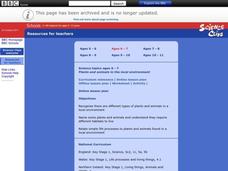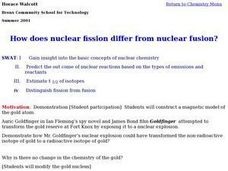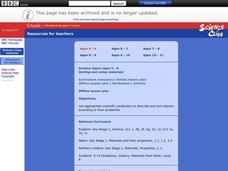Curated OER
The Invention of Faraday Cage
Students demonstrate how Faraday's cage work by building their own electroscope. In this physics lesson, students explain how Faraday's cage work. They cite several applications of this principle in the real world.
Curated OER
Keeping Warm
Students participate in an online activity to determine how objects heat and cool. They determine what objects best serve as thermal insulators.
Curated OER
Pushes and Pulls
Students recognize different types of movement and causes that my affect the movement. They know that pushes and pulls are types of forces.
Curated OER
Habitats
Students participate in an online lesson to determine that different plants and animals are found in different habitats. They use food chains to show feeding relationships in a habitat, and see that nearly all food chains start with a...
Curated OER
Plants and Animals in the Local Environment
Students recognize the different types of plants and animals living in a local environment. They determine how they require different habitats to live, and relate simple life processes to plants and animals found in local environments.
Curated OER
Using Electricity
Students name appliances that use electricity. They construct a simple electrical circuit. They predict whether a circuit work. They name components of an electrical circuit.
Curated OER
Keeping Healthy
Students exercise their muscles to explore concept of heart rate and to explain how blood supplies muscles with oxygen.
Curated OER
Light and Shadows
Students participate in an online lesson to determine how light travels from a source, and to explain that shadows form when light travelling from a source is blocked.
Curated OER
Interdependence and Adaptation
Students construct a food web to identify producer, consumer, herbivore, carnivore and predator. They complete an online activity collecting plants and animals and arranging them in the web. They describe the interdependence between...
Curated OER
Take Two and Call Me in the Morning
Eighth graders are introduced to the workings of the major systems of the Human Body: circulatory, digestive, respiratory, nervous, skeletal, and endocrine Systems. They learn the major organs of the systems and their functions.
Curated OER
Forces and Movement
Students examine types of forces and movements. They identify different causes that can affect movement and speed. They create their own predictions about they believe to be the outcome of an experiment.
Curated OER
How does Nuclear Fission differ from Nuclear Fusion?
Students examine concepts of nuclear chemistry. They compare and contrast the topics of nuclear fission and nuclear fision. They predict the outcome of reactions based on the types of emissions and reactants.
Curated OER
Elements and Compounds
Eighth graders explore the chemical and physical properties of a variety of elements in a lab setting. They organize the data they collect onto a spreadsheet and then choose one element from the periodic table to research. They...
Curated OER
Friction
Students are introduced to the concept of friction. Using that information, they discover ways in which friction can be useful. They participate in different activities to see fricition in action. They complete a grid worksheet and...
Curated OER
Sound and Hearing
Students form an understanding that there are many different types of sound. The core concepts are presented in the most basic form for elementary school. Also students investigate how sound travels.
Curated OER
Sorting and Using Materials
Students practice sorting and classifying objects. In groups, they choose a variety of materials and describe how each one looks and feels. They must agree on how to classify each object and share their groupings with the class. They...
Curated OER
Light and Shadows
Pupils observe and record the apperacne of shadows and how their position and shpae changes during the course of the day. Students measure and record the length oof a partner's shadow at different intervals during the day. In pairs,...
Curated OER
Interdependence and adaptation
Students use keys to identify animals and plants in local habitats. Students are asked if they remember what the word habitat means. Students make a list of three different local habitats and brainstorm animals and plants they might...
Curated OER
Changing circuits
Students identify that there are conventional symbols to represent the components in circuits. Students use these symbols to draw diagrams of circuits. They are reminded that electric circuits can be drawn in diagrams using symbols. ...
Curated OER
Teeth And Eating
Students are introduced to several concepts about milk teeth and permanent teeth. They view photos of baby teeth, complete a worksheet that depicts their current tooth development and identify ways in which to care for permanent teeth.
Curated OER
Solids And Liquids
Learners discuss the properties of solids and liquids. They complete a worksheet to show the boiling and melting points of several substances and consider if these factors affect how humans use materials.
Curated OER
Properties of Rocks
Students compare the properties of rocks. They identify objects made of rocky materials such as walls, sidewalks, etc. Students describe and group rocks based on their characteristics.
Curated OER
Earth, Sun and Moon
Young scholars investigate that the sun is at the center of the solar system through role play. One student is the sun and one student is the Earth. The students then show how the Earth orbits around the sun. Young scholars view a...

























